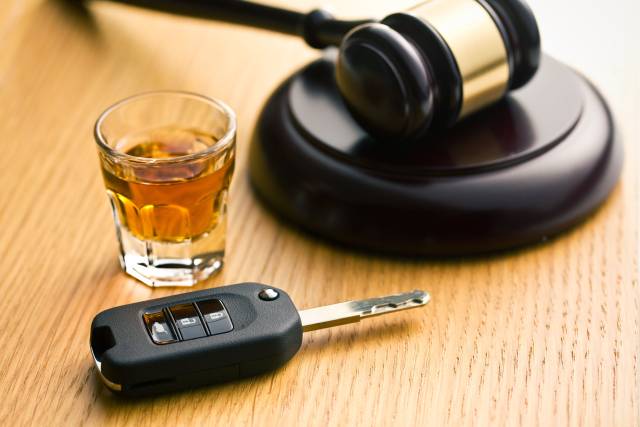Know the Legal Limits
Understanding the legal blood alcohol concentration (BAC) limits is crucial to avoiding DUI consequences in Colorado. The state has set specific limits that determine whether an individual is considered impaired while operating a motor vehicle. In Colorado, it is unlawful for individuals aged 21 and older to drive with a BAC of 0.08% or higher. For drivers under the age of 21, the legal limit is considerably lower, at 0.02%.
It is important to note that even a single drink can push a person’s BAC above the legal limit, depending on factors such as weight, metabolism, and the alcohol content of the beverage consumed.
Colorado uses a strict approach to enforce DUI laws, with severe penalties for those who violate them. These penalties can include fines, license suspension, mandatory alcohol education or treatment, community service, and even jail time. Repeat offenders may face even harsher consequences, including longer license suspensions and mandatory ignition interlock devices.
To avoid DUI consequences, it is advisable to make responsible choices and always have a designated driver if planning to consume alcohol. Additionally, individuals should be aware of their own alcohol tolerance levels and plan accordingly.
Understanding and adhering to the legal BAC limits is essential to ensure the safety of oneself and others on the road, while also avoiding the serious and long-term consequences of a DUI conviction in Colorado.
Understand the Consequences
To fully comprehend the gravity of the situation, it is imperative to grasp the potential ramifications that come with a DUI conviction in Colorado. Understanding the consequences can help individuals make informed decisions and take necessary steps to avoid them.
Here are four key consequences to consider:
- License Suspension: Following a DUI conviction, individuals can face a suspension of their driver’s license. The length of the suspension can vary depending on factors such as blood alcohol concentration (BAC) at the time of arrest and previous DUI offenses.
- Financial Consequences: DUI convictions often come with hefty fines and court fees. Additionally, individuals may be required to pay for alcohol education or treatment programs, ignition interlock devices, and increased insurance premiums.
- Criminal Record: A DUI conviction can result in a permanent criminal record, which can have long-lasting effects on employment opportunities, housing applications, and other aspects of an individual’s life.
- Potential Incarceration: In certain cases, DUI convictions can lead to jail time, especially for repeat offenders or cases involving aggravated circumstances such as accidents causing injury or death.
Plan for Alternative Transportation
When it comes to avoiding the consequences of DUI in Colorado, planning for alternative transportation is crucial.
Rideshare options, such as Uber or Lyft, provide a convenient and reliable means of getting home safely without having to drive under the influence.
Additionally, public transportation alternatives, such as buses or trains, offer a cost-effective and responsible way to travel after consuming alcohol.
Lastly, arranging for a designated driver ensures that someone sober can transport you and your companions safely.
Rideshare Options Available
One important option to consider for alternative transportation in Colorado is utilizing rideshare services. Rideshare services have become increasingly popular in recent years, providing convenient and affordable transportation options for individuals in need of a ride.
Here are four rideshare options available in Colorado:
- Uber: Uber is a widely recognized rideshare platform that connects riders with drivers through a mobile app. With a large network of drivers, Uber offers reliable and efficient transportation services.
- Lyft: Similar to Uber, Lyft is another popular rideshare platform that allows users to request rides using a mobile app. Lyft offers various ride options, including standard cars, luxury vehicles, and even shared rides for cost savings.
- zTrip: zTrip is a unique rideshare service that combines the convenience of app-based booking with the reliability of traditional taxi services. Users can book a ride through the zTrip app or by calling their local zTrip dispatch center.
- Curb: Curb, formerly known as Taxi Magic, is a transportation app that connects users with licensed taxi drivers in their area. With Curb, users can easily hail a taxi, track their ride, and pay using the app.
Public Transportation Alternatives
Utilizing public transportation is a viable alternative for individuals in Colorado to plan for alternative transportation and avoid the consequences of driving under the influence. Public transportation systems provide a safe and reliable means of getting around without the need to operate a vehicle while impaired. By relying on buses, trains, or trams, individuals can ensure they reach their destinations without putting themselves or others at risk.
To further emphasize the benefits of public transportation, let’s take a look at the following table:
| Advantages of Public Transportation | ||
|---|---|---|
| 1. Safety | 2. Cost-effective | 3. Eco-friendly |
Public transportation offers a safer option as it eliminates the risk of accidents due to impaired driving. It is also cost-effective, saving individuals money on gas, parking, and vehicle maintenance. Moreover, public transportation is eco-friendly, reducing carbon emissions and contributing to a greener environment.
Designated Driver Arrangements
To ensure a safe and responsible means of transportation, it is important to establish designated driver arrangements. This can be done by coordinating with a reliable and sober individual who will assume the responsibility of driving. Designated driver arrangements provide an effective way to avoid driving under the influence (DUI) and its severe consequences.
Here are four important considerations when planning for alternative transportation:
- Choose a trustworthy and responsible designated driver who is committed to staying sober throughout the evening.
- Communicate your plans with the designated driver in advance, ensuring they are aware of their responsibilities.
- Establish a backup plan in case the designated driver becomes unavailable or unable to fulfill their role.
- Offer to compensate the designated driver for their time and effort as a gesture of appreciation.
Avoid Drinking and Driving Altogether
Drinking and driving should be completely avoided to prevent the severe consequences of a DUI in Colorado. Not only is it illegal, but it puts the lives of both the driver and others on the road at risk. To emphasize the importance of avoiding this dangerous behavior, let’s take a closer look at the potential consequences of a DUI in Colorado:
| Consequences | Penalties |
|---|---|
| License Suspension | 9 months for first offense |
| Fines | Up to $1,000 for first offense |
| Jail Time | Up to 1 year for first offense |
As the table shows, the penalties for a DUI in Colorado can be substantial. In addition to legal consequences, a DUI can also have a lasting impact on your personal and professional life. It can lead to increased insurance rates, difficulty finding employment, and damage to your reputation.
To avoid drinking and driving altogether, it is important to plan ahead and make responsible choices. This may involve designating a sober driver, using ride-sharing services, or staying overnight at a friend’s place. By taking these precautions, you can ensure your safety and the safety of others on the road, while also avoiding the severe consequences of a DUI in Colorado.
Educate Yourself on DUI Laws
To avoid the consequences of a DUI in Colorado, it is crucial to educate yourself on DUI laws.
Familiarize yourself with the legal alcohol limits and understand the penalties associated with driving under the influence.
Know Legal Alcohol Limits
It is important to familiarize yourself with the legal alcohol limits in Colorado to avoid the consequences of a DUI. Understanding these limits can help you make informed decisions about when it is safe to get behind the wheel. Here are four key points to keep in mind:
- Blood Alcohol Concentration (BAC) Limit: In Colorado, the legal BAC limit for drivers aged 21 and over is 0.08%. This means that if your BAC exceeds this limit, you can be charged with a DUI.
- Zero Tolerance for Underage Drivers: For drivers under the age of 21, Colorado has a zero-tolerance policy. Any detectable amount of alcohol in their system can lead to a DUI charge.
- Commercial Drivers: Commercial drivers in Colorado have a lower BAC limit of 0.04%. This stricter limit is in place due to the increased responsibility associated with operating commercial vehicles.
- Enhanced Penalties: Colorado imposes enhanced penalties for DUI offenses involving high BAC levels or repeat offenses. Familiarize yourself with these penalties to understand the potential consequences of driving under the influence.
Understand DUI Penalties
To fully navigate the legal landscape surrounding DUI consequences in Colorado, it is crucial to educate yourself on the specific penalties associated with driving under the influence. Understanding the potential consequences can help you make informed decisions and take appropriate actions to avoid or minimize the impact of a DUI conviction.
In Colorado, DUI penalties vary based on factors such as blood alcohol concentration (BAC) level, prior convictions, and the presence of aggravating circumstances. For a first-time DUI offense, penalties may include fines, license suspension, mandatory alcohol education programs, probation, and even jail time.
Repeat offenses and DUIs involving injury or death can result in more severe penalties, including longer license suspensions, hefty fines, mandatory ignition interlock devices, and significant prison sentences.
Be Aware of Sobriety Checkpoints
Sobriety checkpoints are a regularly implemented law enforcement strategy in Colorado, aimed at deterring and detecting impaired driving. These checkpoints are typically set up at predetermined locations and times, where law enforcement officers stop vehicles to assess drivers for signs of impairment.
It is crucial for drivers to be aware of sobriety checkpoints and understand how to navigate them safely and legally. Here are four essential tips to keep in mind:
- Plan ahead: Stay informed about the locations and times of sobriety checkpoints in your area. Local law enforcement agencies often publicize this information, allowing you to plan your route accordingly and avoid unnecessary encounters.
- Remain calm and cooperative: When approaching a sobriety checkpoint, it is essential to remain calm and cooperative. Follow the instructions given by law enforcement officers, roll down your window, and provide any requested documents, such as your driver’s license and vehicle registration.
- Know your rights: While sobriety checkpoints are legal, it is essential to understand your rights as a driver. You have the right to remain silent and refuse any field sobriety tests, but be aware that refusal may result in additional consequences, such as the suspension of your driver’s license.
- Drive sober: The most effective way to avoid any consequences at a sobriety checkpoint is to drive sober. Always designate a sober driver, use public transportation, or arrange for a taxi or rideshare service if you have consumed alcohol or drugs.
Know Your Rights During a Traffic Stop
During a traffic stop, drivers in Colorado should be aware of their rights and how to exercise them. Understanding your rights can help protect you from unnecessary search and seizure and ensure that law enforcement follows proper procedures. Here are some key rights that drivers should be familiar with:
| Right | Explanation |
|---|---|
| Right to Remain Silent | You have the right to remain silent and not answer any questions that may incriminate you. |
| Right to Refuse Search | You have the right to refuse a search of your vehicle if the officer does not have a valid reason or a search warrant. |
| Right to Legal Counsel | If you are arrested, you have the right to an attorney. It is important to exercise this right before answering any questions. |
Stay Calm and Cooperative With Law Enforcement
Remaining calm and cooperative with law enforcement is crucial when interacting with them during a traffic stop in Colorado. It is important to remember that law enforcement officers are trained professionals who are just doing their job to keep the roads safe. By following these essential tips, you can ensure a smoother interaction and potentially minimize any negative consequences:
- Stay composed: Take a deep breath and stay calm. Keep your hands visible on the steering wheel, and avoid sudden movements that could raise suspicions.
- Be respectful: Treat the officer with respect and courtesy. Use polite language and avoid arguing or becoming confrontational. Remember, maintaining a cooperative attitude can help de-escalate the situation.
- Comply with instructions: Listen carefully to the officer’s instructions and follow them promptly. This may include providing your identification, vehicle documents, and answering basic questions. Cooperating with their requests will demonstrate your willingness to cooperate.
- Know your rights: While it’s important to cooperate, it’s equally important to be aware of your rights. You have the right to remain silent, and you can politely exercise this right if you feel uncomfortable answering certain questions. However, it is crucial to do so respectfully and without resistance.
Hire a Qualified DUI Attorney
When facing a DUI charge in Colorado, hiring a qualified DUI attorney is crucial.
A DUI attorney has the necessary legal expertise to navigate the complex laws surrounding DUI offenses.
Legal Expertise Matters
To effectively navigate the legal landscape of a DUI case in Colorado, it is imperative to secure the services of a qualified DUI attorney. Hiring a skilled lawyer who specializes in DUI cases can significantly impact the outcome of your case. Here are four reasons why legal expertise matters:
- Knowledge of the law: A qualified DUI attorney will have a deep understanding of Colorado’s DUI laws, ensuring that they can effectively analyze the evidence and identify any legal loopholes or weaknesses.
- Experience in DUI cases: With their experience handling similar cases, a DUI attorney will have the expertise to build a strong defense strategy tailored to your specific circumstances, increasing your chances of a favorable outcome.
- Relationships with the prosecution: A seasoned DUI attorney will have established relationships with prosecutors and judges, allowing them to negotiate on your behalf and potentially secure reduced charges or penalties.
- Courtroom advocacy: A skilled DUI attorney will confidently represent you in court, presenting compelling arguments, cross-examining witnesses, and challenging evidence, maximizing your chances of a successful defense.
Protect Your Rights
Securing the services of a qualified DUI attorney is crucial to protect your rights and navigate the legal complexities of a DUI case in Colorado. A DUI conviction can have severe consequences, including hefty fines, license suspension, mandatory alcohol education programs, and even jail time. Hiring an experienced DUI attorney can make a significant difference in the outcome of your case. They have a deep understanding of Colorado’s DUI laws, the court system, and the strategies to challenge the evidence against you. By hiring a qualified attorney, you ensure that your rights are protected, and you have the best chance of minimizing the potential consequences. Don’t underestimate the importance of legal expertise when facing a DUI charge. Take the time to find a skilled DUI attorney who can effectively defend your case.
| Benefits of Hiring a Qualified DUI Attorney | |
|---|---|
| Expert knowledge of DUI laws | |
| Understanding of the legal system | |
| Ability to challenge evidence |
A qualified DUI attorney possesses expert knowledge of the specific DUI laws in Colorado. They stay up-to-date with any changes or amendments to the legislation and know how to apply these laws to your case. Additionally, they have a deep understanding of the legal system, including court procedures and processes. This knowledge allows them to navigate the complexities of your DUI case effectively. Moreover, a qualified DUI attorney has the skills and experience to challenge the evidence presented against you. They can identify any weaknesses or inconsistencies in the prosecution’s case and develop strategies to challenge the evidence in court. By hiring a qualified DUI attorney, you are putting yourself in the best position to protect your rights and achieve a favorable outcome.
Minimize Potential Penalties
By employing the services of a qualified DUI attorney, individuals can effectively minimize the potential penalties associated with a DUI conviction in Colorado. Here are four ways a DUI attorney can help:
- Legal expertise:
A DUI attorney has in-depth knowledge of Colorado’s DUI laws and can navigate the complex legal system on your behalf. - Case evaluation:
A qualified attorney will thoroughly analyze the details of your case, including the evidence and police procedures, to identify any potential weaknesses or violations of your rights. - Defense strategies:
With their expertise, a DUI attorney can develop strong defense strategies tailored to your specific case, aiming to challenge the prosecution’s evidence and mitigate the charges against you. - Negotiation and advocacy:
A skilled attorney can negotiate with prosecutors to potentially reduce the charges or penalties you face. If necessary, they can also advocate for your rights and present your case convincingly in court.
Hiring a qualified DUI attorney can significantly increase your chances of minimizing the consequences of a DUI conviction in Colorado.
Seek Treatment if Necessary
If an individual is facing a DUI charge in Colorado, it is crucial to promptly seek appropriate treatment, if deemed necessary. Seeking treatment not only demonstrates responsibility and a commitment to addressing the issue at hand, but it can also have a positive impact on the outcome of the case. By taking proactive steps towards rehabilitation, individuals can show the court that they are taking their offense seriously and are willing to make changes to prevent future incidents.
To ensure that individuals are aware of the available treatment options, the following table outlines some common forms of treatment for alcohol-related offenses in Colorado:
| Treatment Option | Description | Benefits |
|---|---|---|
| Alcohol Education | Educational programs aimed at increasing knowledge about DUI | Enhances understanding of the consequences of alcohol abuse |
| Counseling/Therapy | One-on-one or group sessions to address underlying issues | Provides support and guidance for overcoming alcohol misuse |
| Alcoholics Anonymous | Support group for individuals struggling with alcohol addiction | Offers peer support and a structured recovery program |
It is important to note that seeking treatment should be done in consultation with legal counsel to ensure compliance with any court-mandated requirements. By taking the necessary steps to address alcohol-related issues, individuals facing a DUI charge in Colorado can demonstrate their commitment to personal growth and rehabilitation, potentially leading to more favorable outcomes in their legal proceedings.
Learn From Your Mistakes and Make Positive Changes
To effectively navigate the consequences of a DUI charge in Colorado, individuals must reflect on their mistakes and proactively make positive changes. It is crucial to learn from the experience and take steps towards personal growth and responsibility. Here are four key actions to consider:
- Acceptance and Accountability:
Acknowledge the mistake and take full responsibility for the actions that led to the DUI charge. Acceptance is the first step towards making positive changes and avoiding similar situations in the future. - Educate Yourself:
Seek knowledge about the effects of alcohol on your body and mind, as well as the legal implications of DUI. Understanding the risks and consequences can help you make informed decisions and avoid repeating past mistakes. - Develop Healthy Habits:
Make a conscious effort to adopt healthy lifestyle choices that promote responsible drinking or abstinence altogether. This may include seeking support through counseling or joining support groups to address any underlying issues that may contribute to alcohol misuse. - Create a Safety Plan:
Plan ahead and establish strategies to prevent future incidents. This may involve designating a sober driver, using rideshare services, or finding alternative transportation options. By having a safety plan in place, you can avoid putting yourself and others at risk.
Conclusion
In conclusion, it is crucial to be well-informed about DUI laws and consequences in Colorado to avoid any legal troubles and ensure public safety.
By knowing the legal limits, planning alternative transportation, and seeking legal advice when needed, individuals can make responsible choices and prevent the negative consequences of driving under the influence.
Remember, staying educated, cooperative with law enforcement, and making positive changes can help create a safer community for everyone.




